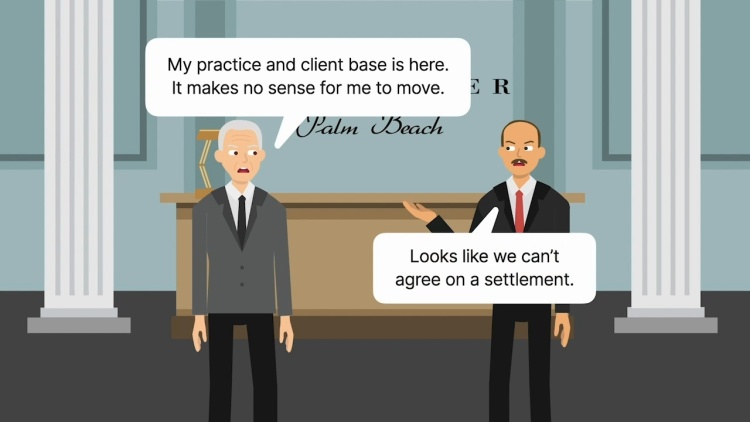Cadwalader, Wickersham & Taft v. Beasley
Florida Court of Appeal
728 So. 2d 253 (1998)

- Written by Sean Carroll, JD
Facts
James Beasley (plaintiff) was an established estate-planning lawyer in South Florida with many local clients. In 1989, Beasley joined the Palm Beach office of the law firm Cadwalader, Wickersham & Taft as a partner. In 1994, Cadwalader decided to close the Palm Beach office due to its unprofitability. Cadwalader informed Beasley that he could remain a partner with the firm, but would have to relocate to either the Washington, D.C., or New York office. Alternatively, Cadwalader offered Beasley a severance package for his withdrawal from the partnership. Beasley brought suit for fraud and breach of fiduciary duty. The trial court ruled in favor of Beasley, finding that Cadwalader anticipatorily breached the partnership agreement. The court awarded Beasley over $2.5 million in damages, including his capital contribution plus interest, his proportional interest in partnership assets, the profits attributable to Beasley’s use of his right in the firm’s property, punitive damages, and attorney’s fees. Cadwalader appealed, arguing, in part, that Beasley voluntarily withdrew from the firm when he did not accept the transfer to another office. Cadwalader’s partnership agreement did not contain an expulsion provision.
Rule of Law
Issue
Holding and Reasoning (Polen, J.)
What to do next…
Here's why 907,000 law students have relied on our case briefs:
- Written by law professors and practitioners, not other law students. 47,100 briefs, keyed to 996 casebooks. Top-notch customer support.
- The right amount of information, includes the facts, issues, rule of law, holding and reasoning, and any concurrences and dissents.
- Access in your classes, works on your mobile and tablet. Massive library of related video lessons and high quality multiple-choice questions.
- Easy to use, uniform format for every case brief. Written in plain English, not in legalese. Our briefs summarize and simplify; they don’t just repeat the court’s language.





